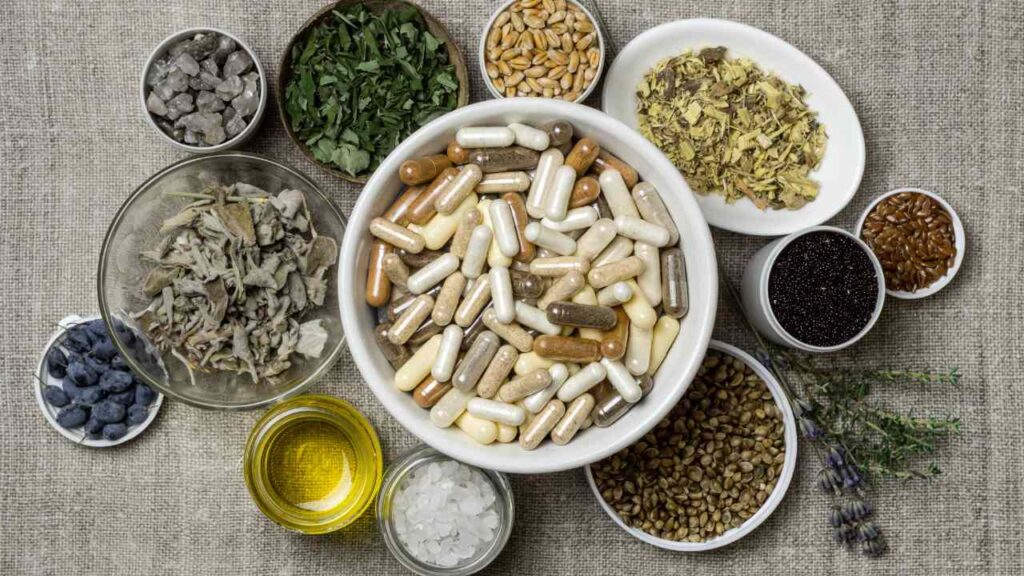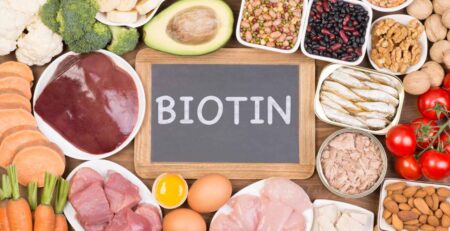Best Vitamins for Gut Health and Bloating: Balance Between Natural And Non-Natural
Our digestive systems are complex and sensitive, often thrown off balance by stress, diet, and lifestyle factors. Luckily, certain vitamins and supplements can lend a helping hand in restoring gut health and reducing uncomfortable bloating.
The best approach often involves balancing natural and non-natural options. Probiotics and prebiotics offer powerful support for healthy gut bacteria, while digestive enzymes can assist in breaking down difficult-to-digest foods. Some vitamins, like vitamin D, also affect gut health.
Additionally, exploring natural remedies like ginger or Ayurvedic supplements may provide further relief.
This blog will explore the best vitamins for gut health and bloating. We’ll discuss their benefits for both men and women, how they might aid in weight loss, and natural alternatives for those seeking a holistic approach.
Let’s start the journey towards a happier, healthier gut!
Essential Vitamins for Gut Health and Bloating
Optimal gut health is crucial for overall wellness, and certain vitamins play pivotal roles in ensuring the digestive system functions effectively.
Let us share the benefits of Vitamin D, B Vitamins, and Vitamin C in supporting gut health and mitigating issues like bloating, which can significantly affect daily comfort and well-being.
Vitamin D: Guardian of Gut Health
Vitamin D is commonly celebrated for its role in bone health, but its influence extends significantly into gut health and immune function. This vital nutrient helps maintain the integrity of the gut lining, preventing unwanted pathogens from entering the bloodstream and causing inflammation.
By strengthening this barrier, Vitamin D supports overall digestive health and helps maintain the delicate balance of the gut microbiome.
Research also suggests that Vitamin D can modulate the immune system’s response, reducing chronic inflammation often associated with digestive discomfort and disorders.
For individuals experiencing bloating and other digestive issues, ensuring adequate Vitamin D levels can help manage these symptoms by maintaining a healthier gut environment.
B Vitamins: Energizing Gut Function
The B Vitamin complex, including B1 (thiamine), B2 (riboflavin), B3 (niacin), B5 (pantothenic acid), B6, and B12, plays a critical role in energy metabolism. It helps convert dietary energy into fuel for cells. Beyond their metabolic roles, B Vitamins are essential for maintaining a healthy gut environment.
They aid in producing digestive enzymes and support the muscles that move food through the stomach and intestines, which can help reduce symptoms of bloating and discomfort.
Additionally, certain B Vitamins, such as niacin (B3), have been noted for their role in supporting the gut lining, which can help prevent inflammation and maintain overall digestive health.
For anyone struggling with bloating, supplementing with B Vitamins can ensure the digestive system has the tools to effectively break down food and reduce buildup that might lead to discomfort.
Vitamin C: Reducing Gut Inflammation
Vitamin C is a powerful antioxidant essential in combating inflammation within the digestive tract. Its antioxidant properties help protect the cells lining the gut from damage caused by free radicals, which can occur from poor diet, stress, or environmental toxins.
Vitamin C helps soothe inflammation in the gut by reducing oxidative stress, aiding in tissue repair, and facilitating smoother digestion.
For those experiencing bloating, Vitamin C can be particularly beneficial. It assists in the breakdown of food, decreases the accumulation of gas, and supports the overall health of the digestive system. Ensuring adequate Vitamin C intake through diet or supplementation can significantly impact how comfortably your body processes food.
Age-Specific Vitamin Needs For Gut Health And Bloating
Our nutritional requirements evolve as we age, particularly regarding vitamins essential for maintaining gut health and preventing bloating.
Tailoring vitamin intake to your specific life stage can significantly enhance digestive function and overall well-being.
Here’s how different age groups can optimize their vitamin consumption for gut health.
Young Adults: Laying a Healthy Foundation
For young adults, focusing on a diet rich in essential vitamins is crucial for setting the stage for long-term gut health. Preventive measures during these years can help mitigate common digestive issues later in life.
- Fiber and Vitamin D: Adequate fiber-rich foods and Vitamin D intake can help maintain a healthy digestive tract and prevent bloating. Fiber helps regulate digestion and prevent constipation, while Vitamin D supports the immune system and the health of the gastrointestinal tract.
- Probiotics: Incorporating probiotic-rich foods or supplements can also be beneficial. Probiotics help maintain a healthy balance of gut bacteria, are essential for proper digestion, and can help prevent bloating and gas.
- B Vitamins: B Vitamins are vital for metabolic processes and help convert food into energy, reducing the likelihood of bloating and supporting overall gut health.
Middle Age: Addressing Emerging Challenges
As individuals enter middle age, digestive efficiency can decline, and issues like bloating become more prevalent. Addressing these changes proactively with specific vitamins can help maintain digestive health.
- Antioxidants: Vitamins A, C, and E can help protect the digestive tract from oxidative stress, which increases with age. These vitamins support the repair of digestive tissues and help maintain the integrity of the gut lining.
- Magnesium: This mineral aids in regular muscle function, including those of the digestive tract, helping to prevent constipation and reduce bloating.
- Omega-3 Fatty Acids: While not a vitamin, omega-3 fatty acids reduce inflammation in the body, including the digestive tract, which can help alleviate bloating and discomfort.
Seniors: Supporting Diminishing Digestive Function
Digestive function tends to decline in older adults, partly due to a natural decrease in stomach acid production and changes in gut motility. Specific vitamins can help manage these issues and maintain gut health.
- Vitamin B12: Absorption of Vitamin B12 decreases with age due to reduced stomach acid. This vitamin is crucial for maintaining energy and healthy nerve cells in the gut. Supplementation might be necessary to prevent deficiency.
- Calcium and Vitamin D: Both are essential for bone health and the digestive system. They help maintain muscle health, including the digestive tract muscles, which can prevent constipation and reduce the risk of bloating.
- Vitamin K: This vitamin is important for seniors as it helps clot blood and maintain healthy bones. It’s also vital for gut health, as it supports the integrity of the gut lining.
Natural and Ayurvedic Supplements for Optimal Gut Health

Natural and Ayurvedic supplements offer valuable benefits for those seeking holistic approaches to enhance gut health and alleviate bloating. These remedies have been used for centuries and are well-regarded for their efficacy in promoting digestion and overall well-being.
We will examine how probiotics, digestive enzymes, and specific Ayurvedic herbs can contribute to a healthier digestive system.
Probiotics: Balancing Gut Flora
Probiotics are live bacteria and yeasts that benefit the digestive system. They are often called “good” or “helpful” bacteria in supplements and fermented foods because they help keep the gut healthy.
- Benefits for Digestion and Health: Probiotics help balance the gut flora, which is essential for proper digestion. They can also combat dysbiosis (an imbalance of gut bacteria), which is often a culprit in bloating, gas, and indigestion.
- Enhancing Digestion: Probiotics facilitate smoother digestion by enhancing the gut flora balance. They have also been shown to reduce symptoms of irritable bowel syndrome (IBS) and inflammatory bowel diseases (IBD).
- Reducing Bloating: Regular consumption of probiotics can help reduce bloating and prevent the build-up of gas, providing relief and comfort.
Digestive Enzymes: Boosting Food Breakdown
Digestive enzymes are crucial in separating food into nutrients the body can more easily absorb. Supplementing with digestive enzymes can be particularly beneficial for those who experience digestive discomfort or have conditions that impair digestive enzyme production.
- Improving Efficiency: These supplements assist in breaking down complex foods such as proteins, fats, and carbohydrates, which can sometimes be challenging for the body to process effectively.
- Reducing Bloating: Digestive enzymes can help minimize the likelihood of fermentation in the gut, which often leads to bloating and gas, by enhancing the breakdown and absorption of foods.
Ayurvedic Herbs for Digestive Health
Ayurveda, the traditional Indian system of medicine, utilizes a variety of herbs known for their digestive benefits. Herbs like Triphala, Ginger, and Fennel are staples in Ayurvedic medicine to improve gut health and alleviate digestive issues.
- Triphala: A staple in Ayurvedic medicine, Triphala is a blend of three fruits that acts as a natural laxative, helping to cleanse the gut and improve digestion. It is known for its gentle, nourishing properties and ability to support regular bowel movements.
- Ginger: Renowned for its anti-inflammatory properties, ginger stimulates digestion and soothes the stomach. It can help relieve nausea and is effective in calming an upset stomach.
- Fennel: Often used as a traditional remedy for bloating and gas, fennel seeds contain compounds that can relax the muscles in the gastrointestinal tract, reducing gas, bloating, and stomach cramps.
Integrating Vitamins and Supplements for Improved Gut Health
Enhancing gut health and reducing bloating through vitamins and natural supplements can be a game-changer in your overall wellness routine. There are ways to safely and effectively incorporate these elements into your daily regimen, ensuring you gain all the potential health benefits while minimizing risks.
Incorporating Vitamins Through Diet
The most natural way to increase your intake of beneficial vitamins is through a well-balanced diet. Here’s how you can ensure you’re getting enough of the key vitamins that support gut health:
- Fruits and Vegetables: Rich in dietary fiber, antioxidants, and essential vitamins, fruits and vegetables like berries, leafy greens, and bell peppers can help enhance gut health and reduce bloating.
- Fermented Foods: Items such as yogurt, kefir, sauerkraut, and kimchi are excellent sources of natural probiotics, which help balance gut flora and improve digestion.
- Whole Grains: Incorporating whole grains like oats, barley, and quinoa provides B vitamins and fiber, which support efficient digestion and metabolic health.
Using Supplements Wisely
While getting nutrients from food is ideal, supplements can play a crucial role in filling nutritional gaps, especially for nutrients that are difficult to obtain in sufficient amounts from diet alone:
- Probiotic Supplements: If dietary probiotic intake is insufficient, supplements can be a helpful addition, especially for those struggling with digestive issues like bloating.
- Digestive Enzymes: These can be particularly beneficial for individuals with conditions that impair digestion, such as pancreatitis or after certain surgeries.
- Herbal Supplements: Ayurvedic herbs like Triphala, ginger, and fennel can be taken in capsule or tea form, providing a concentrated dose that may help improve digestion and reduce bloating.
Consultation with Healthcare Providers
Before starting any new supplement regimen, it’s essential to consult with a healthcare provider, especially under the following conditions:
- Existing Health Conditions: Supplements can sometimes have adverse effects if you have any underlying health issues, especially those involving the gut or liver.
- Medication Interactions: Vitamins and supplements can interact with medications, potentially altering their effectiveness or causing side effects. For example, Vitamin K can interfere with blood thinners, and high doses of Vitamin C can affect the absorption of certain types of iron.
- Personalized Recommendations: A healthcare provider can offer advice tailored to your specific health needs and conditions, ensuring that any supplements you take are beneficial and appropriate for your situation.
Final Words
Restoring gut health is an ongoing journey, not a quick fix. While vitamins and supplements can be valuable allies, addressing the root causes of your bloating and digestive issues is essential.
This might involve dietary changes, stress management techniques, or consulting a healthcare professional for personalized guidance.
Our digestive needs and sensitivities can shift throughout life. Be open to experimenting with different combinations of natural and non-natural supplements to find what works best for you at any given time.
Consult your doctor before making significant changes, especially if you have underlying health conditions.
By optimizing your gut health, you may experience benefits beyond reduced bloating. A healthy gut can positively impact your immune system, energy levels, and mood and even contribute to easier weight management.
So, listen to your body, prioritize gut-friendly choices, and take advantage of the natural and non-natural support available to achieve a healthier, more comfortable you!












Leave a Reply